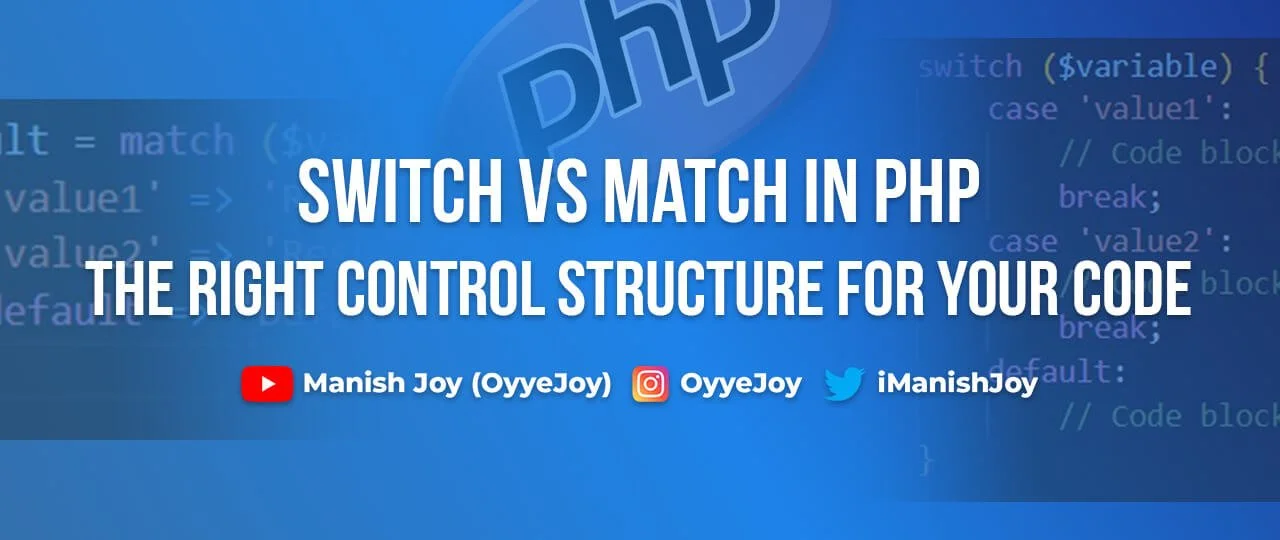Switch vs Match in PHP: Choosing the Right Control Structure for Your Code
When it comes to writing efficient and readable code in PHP, selecting the appropriate control structure is crucial. In PHP 8, two new control structures were introduced: “match” and “switch”. These structures offer a more concise and expressive way to handle multiple conditions. In this blog post, we will explore the differences between switch and match in PHP and discuss when to use each one, helping you make an informed decision for your coding needs.
Understanding “switch” in PHP
The switch statement has been a staple in PHP for a long time, providing a simple way to check a variable against multiple conditions. It allows you to execute different blocks of code based on the value of a variable. Here’s a basic syntax example:
switch ($variable) {
case 'value1':
// Code block to execute if $variable is 'value1'
break;
case 'value2':
// Code block to execute if $variable is 'value2'
break;
default:
// Code block to execute if $variable does not match any cases
}The switch statement evaluates the value of the variable against the cases defined using “case” and executes the corresponding code block. If no matches are found, the code block defined in “default” is executed.
Introducing “match” in PHP 8.x
With the release of PHP 8, the “match” expression was introduced as a more robust alternative to switch. Match provides a more concise syntax and offers additional features, making it an attractive option for handling complex conditions. Let’s take a look at an example:
$result = match ($variable) {
'value1' => 'Result 1',
'value2' => 'Result 2',
default => 'Default Result',
};In this example, the match expression evaluates the value of the variable and returns the corresponding result. If no matches are found, the value specified in “default” is returned. Match expressions are more flexible than switch statements, as they can evaluate arbitrary expressions, not just variables.
Differences between Switch and Match
- Conciseness and Readability: Match expressions are generally more concise and readable compared to switch statements. The match expression allows you to define the expected results directly, whereas switch requires explicit “case” statements followed by blocks of code.
- Strict Comparison: Switch statements use loose comparison (==), meaning type coercion can occur during evaluations. Match expressions, on the other hand, use strict comparison (===) by default, ensuring both the value and type match.
- Return Value: Match expressions can return a value, making them suitable for assigning results directly to variables. Switch statements don’t have a direct return value; instead, you need to use additional variables to store the result.
- Exhaustiveness Check: Match expressions require that all possible values are covered by the defined cases. If a value is missing, PHP will raise a warning. Switch statements do not have this requirement, allowing for unintentional omissions.
Choosing the Right Control Structure
While both switch and match have their merits, choosing the appropriate control structure depends on the specific requirements of your code. Here are some guidelines to help you make the right decision:
- Use switch when you need to perform different actions based on the value of a variable and require fall-through behavior between cases.
- Use match when you want to perform simple value matching and need a concise and expressive syntax.
- Consider match for complex conditions, as it offers strict comparison, return values, and exhaustiveness checks.
Conclusion
In PHP 8, the introduction of match expressions provides developers with a more concise and powerful alternative to switch statements. The switch statement remains a reliable choice for simple value-based conditions with fall-through behavior. However, match expressions offer a more modern syntax, strict comparison, and the ability to return values directly. By understanding the differences between switch and match, you can make informed decisions and write cleaner, more efficient code in PHP.
If you need any more help, feel free to contact me. Happy Coding ✌️
Liked the post, share with others:




